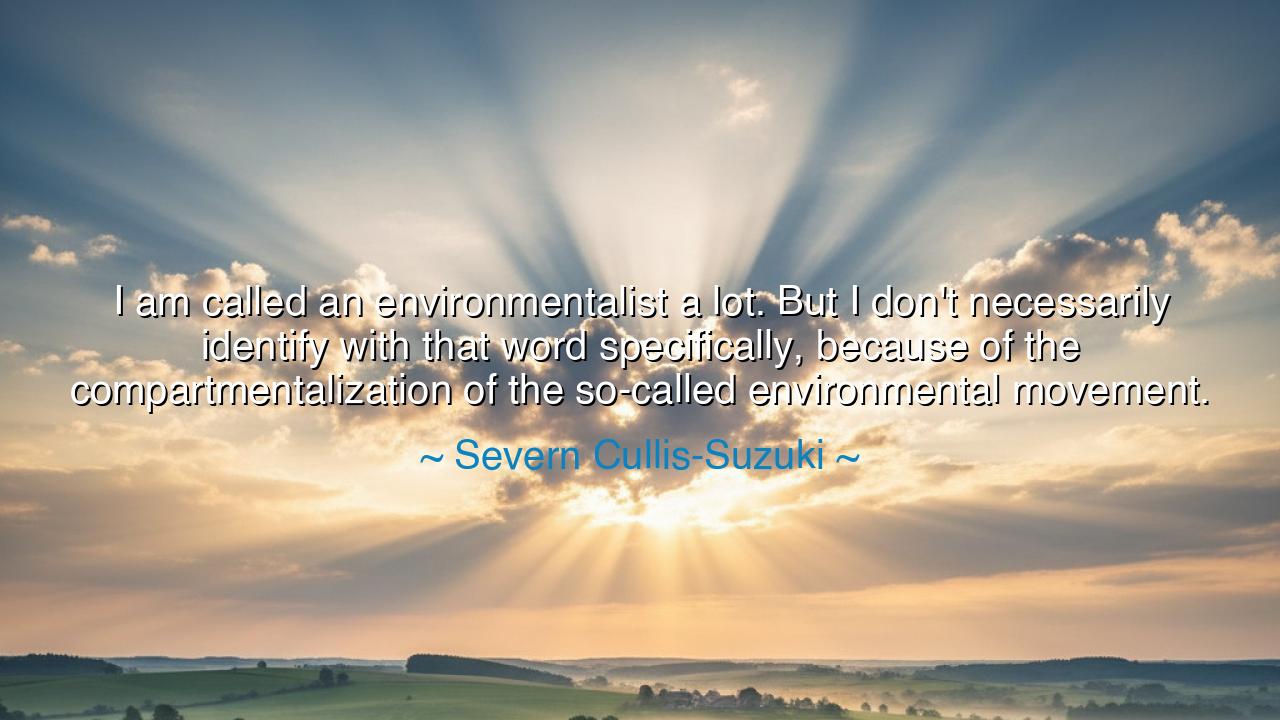
I am called an environmentalist a lot. But I don't necessarily
I am called an environmentalist a lot. But I don't necessarily identify with that word specifically, because of the compartmentalization of the so-called environmental movement.






Hear, O guardians of the earth, the voice of Severn Cullis-Suzuki, who declared: “I am called an environmentalist a lot. But I don't necessarily identify with that word specifically, because of the compartmentalization of the so-called environmental movement.” These words come from one who has walked the path of truth since youth, who as a child stood before the leaders of nations and spoke with the fire of innocence and wisdom. In her confession lies a warning: that titles, though useful, can also confine; that movements, though mighty, may falter when they divide themselves into narrow chambers rather than embracing the wholeness of life.
The ancients taught that man is not separate from the world, but part of a great harmony, the cosmos itself. To divide environmentalism into compartments—one movement for oceans, another for forests, another for climate—is to forget that the sea and the soil, the sky and the spirit, are one. Severn reminds us that to call her merely an “environmentalist” is to risk placing her in a box too small for the truth she seeks to carry. She does not reject the cause, but the compartmentalization that weakens it, reducing the vastness of interconnected struggles into isolated campaigns.
Consider the story of Chief Seattle, who in the nineteenth century spoke of the bond between people and the earth. He said, “Whatever befalls the earth befalls the sons of the earth.” He did not speak of rivers alone, nor forests alone, but of the whole, as one living body. This is the same spirit that breathes through Severn’s words. When movements become fragmented, they risk forgetting the unity of life, and in that forgetting, their power wanes. The wisdom of Chief Seattle and Severn together teaches us that the path forward is not through compartments, but through wholeness.
Mark also the fate of the ancient city of Babylon, where the people sought to build a tower reaching the heavens. Their unity was their strength, but when their tongues were divided, their efforts crumbled into dust. So it is with the environmental movement: when divided into compartments, when voices speak past each other, the tower of change cannot rise. But when the voices join, when the rivers and forests and skies are seen as one battle, then the foundation is unshakable.
The meaning of Severn’s declaration is thus both personal and universal. Personally, she resists the label environmentalist, for it suggests a single path, a narrow cause. Universally, she calls all of us to see beyond labels and beyond compartments, to embrace the interwoven struggles of humanity and earth alike. For the destruction of forests is tied to the hunger of the poor, the pollution of rivers to the health of children, the burning of fuels to the fate of nations. To separate them is folly; to unite them is wisdom.
The lesson for future generations is this: be wary of names that bind too tightly, and movements that divide what must be whole. Remember that the health of the environment is not one issue among many—it is the breath of life itself. To fight for it is not to stand in one camp, but to stand for all. Thus, do not call yourself merely an “environmentalist,” but a guardian of creation, a steward of justice, a protector of life.
Practical action lies before us: break down the walls that separate causes. Do not say, “This is about the trees, but not about the people,” or “This is about the animals, but not about the workers.” See all as one, and labor for unity. Support movements that connect climate with justice, environment with economy, forests with communities. And in your own speech, avoid the narrowness of labels—speak instead of the whole, and remind others that all battles for life are one battle.
So let it be remembered: Severn’s voice, rising from the innocence of childhood into the strength of maturity, calls us to unity. Compartmentalization is weakness; wholeness is strength. To fight for the earth is to fight for humanity, and to fight for humanity is to fight for the earth. Let no label bind you, but let the fullness of truth guide you, until all voices join together in the one song of life.






AAdministratorAdministrator
Welcome, honored guests. Please leave a comment, we will respond soon